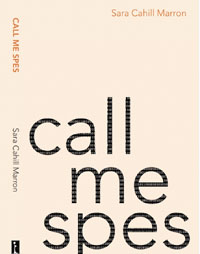|

Call Me Spes is one of the most remarkable books of poetry I've read in
quite a long while. Sara Cahill Marron has invented a new poetic language
with which to lead us through the modern-day technological Inferno that
we now live in. The word "Inferno" is apt since Dante acts as a presiding
spirit and quotations from that epic and his Purgatorio adorn many of the
poems. However, as the title suggests—"spes" is Latin for "hope"—with the
poet as expert guide, we might well find hope, indeed, even as we slowly
progress toward Paradiso.
It isn't possible to write a conventional review of this book. It is not a
collection of discrete poems, or poems in thematic clusters.
At the very beginning, before the Table of Contents: "PRIVACY
WARNING: The longer you hold me, the closer we become." The TOC
itself, laid out like a smartphone screen, with the time, the WIFI icon, and
battery level displayed across the top. And then the Prologue makes clear
what direction we are going, if not precisely where: "An operating system
falls for its user."
As the OS acquires more and more human language by overhearing the
conversations that take place in its surroundings, as it correspondingly
speaks in less and less binary code, as it slowly transforms from iOS122 to
Spes, we follow breathlessly, with a curiosity that is a mixture of fear and,
yes, hope.
To try to pull quotes or highlight passages would do this book a great
injustice. It needs to be read whole, from beginning to end, like the
contemporary epic it is. Better to let Sara herself speak about her thoughts,
intentions and process. When I requested an interview, she not only
graciously agreed, but provided a full, rich discussion of her work.
I have so many questions! Here are just a few.
What was the genesis of this collection? When did the subject of
our intimacy with our devices and the potential for an actual
mutual relationship arise in your imagination?
I started thinking about this in 2017, when I moved cities again to pursue a
law degree. I worked a day job at a firm that specialized in intellectual
property litigation—a lot of the documents I looked at day to day were
technical in nature, exposing me to creative designs that I'd never given a
passing thought to. I saw a micro SD for the first time, drawings of the
connections that build the little device so many of us carry around and was
instantly fascinated.
I had been working on a collection of "short stories" for a few months
around that time, a bit of a Spoon River Anthology of characters that had
distinct voice, speech pattern and rhythm. Many of those first drafts
evolved into the characters that Spes learns from, in the book. It was
suggested to me by a good friend, and my now-business partner, Indran,
that the book lacked a cohesive quality. He suggested adding a narrator.
That was the birth of Spes: she was the narrator to the characters that were
so important to me, she connects them through her own struggle to
understand them.
Six or seven years ago, I did not view computers, code, and artificial
intelligence the same way I do today. The intimacy with technology
seemed obvious once I stopped resenting how much it had infiltrated my
life (think: allowing location services so Google Maps will function,
allowing my personal health information to exist in an app). I had trusted
the technology with these details, intentionally, because I was gaining
something from choosing to trust. With cell phones and computers, we
place a lot of trust in the operating systems that we use on a daily basis.
Little by little, a passcode becomes facial recognition and suddenly my
device contains a reflection of me. It is a reflection like Narcissus, staring
into the pool. The obsession is merely because I'm seeing myself.
That's a long way of saying that the intimacy that struck me was the trust
and development of "self" through the use of technology. I started weaving
the characters I had sketched out as minor characters, with the Narcissus
figure being the technology itself.
Please elaborate on the meaning of the title. What is the hope
you see?
As I was writing the device poems ("Dear User"), the intent was to start
with a cold, technological tone that would slowly morph into something
more "human." Honestly, it was only in the process of writing Spes' poems
that I realized she must name herself. When a baby is born, we give it a
name, which is just a collection of letters and sounds, but something that
holds meaning. Through listening, the operating system becomes aware of
this significance of language and, almost coveting, choses one for herself.
I liked the word Spes for many reasons, one of which is that I had never
come across it and it seemed like a fun easter egg to drop in the text. The
biggest reason for my choice was the subtle irony of the narrator choosing
her perception—especially as Big Data news started to take over the
headlines. The characters are also a bit of a hopeless lot—they are addicted
to drugs, gambling, women, or caught in the "system" of constant arrests,
tumultuous finances, and other human woes. The operating system digests
these stories, and after each, attempts to reconcile one with the other.
The use of the word Spes, in the naming and in the title was not so much a
commentary on my personal feelings about the future of technology, but
about human interaction with it.
When did Dante enter the picture and why?
This is an easy one: the first COVID summer, 2020. I had tinkered with
what was essentially a completed manuscript for many months at this point
in time, but I still felt the message was not as clear as it could be. The story
needed an arc and signposts. I have a copy of the Divine Comedy that I've
owned for years, and I picked it up. It's a familiar story to most, even if
you've never read it cover to cover: a soul is guided through the stages of
the afterlife, sprinkled with moral commentary on our human focuses on
this earth. I found it especially entertaining to read during the COVID era,
as politics and health became hopelessly meshed.
That's what inspired me to echo the structure of the Divine Comedy in
Spes, with little nods to the text itself throughout the book. In Spes, Hell is Molten, the form of liquid glass at extremely high temperatures. Suspended
Fusion is Purgatory, a state a falling in mid-air from the heat center in
order to reach Glassifying, a Heaven. These three chapter titles come from
the process of engineering the glass that is used on cell phones. It's a highly
patented process (fun fact: Corning, the glass cookware company, owns one
of the most widely used patents for iPhone glass).
Dante gave me both the structure and pithy political irony I was looking for
to tell a story that cannot be separated: the soul, love and loss, and the pain
of those two things.
Do you foresee continuing to write on this topic?
I would love to—I'm thrilled that Natural Language Processing is in the
mainstream now. I won't spoil the ending of Spes, but I'm still
brainstorming on how to write her next journey. Where I left her in the
book was certainly not hopeful, for Spes as an entity in and of herself.
However, I'm inspired by Artificial Intelligence's explosion into the
popular, which now makes it political. There is certainly more to the story.
What are you writing about these days? Do you have your next
book in the works?
Yes! Always. I haven't been writing the same way as I was during the years Spes was developed. I find that, as a poet, I am inspired (and I suppose,
influenced) heavily by what I intake and learn about each day, not unlike Spes as a figure trying to make sense of the world around me by naming
things. Lately, I've been living on Long Island where there are
Oystercatchers, humpbacks, and swans. It is the land of Whitman's Leaves
of Grass and the bays perfume the whole island with their vast connection
to the ocean beyond. I feel so peaceful here, and much of my poetry is now
rooted in the environmental. I've got a follow-up book to Reasons For the
Long Tu'm in the works that will reflect the Luminous Mysteries of the
Rosary. Structure, clearly, really fascinates me. We organize our lives
according to: the words we know belong to certain colors, animals, smells
and the way we identify who we are to others. This next book does what Tu'm does: centers the lyric on the finite. Each chapter is ten poems (ten
decades) loosely written around a topic from the Rosary's mysteries.
Thanks very much for your time—and your book.

To learn more about Sara Cahill Marron and to order Call Me Spes, visit
her website: https://www.saracahillmarron.com/
|